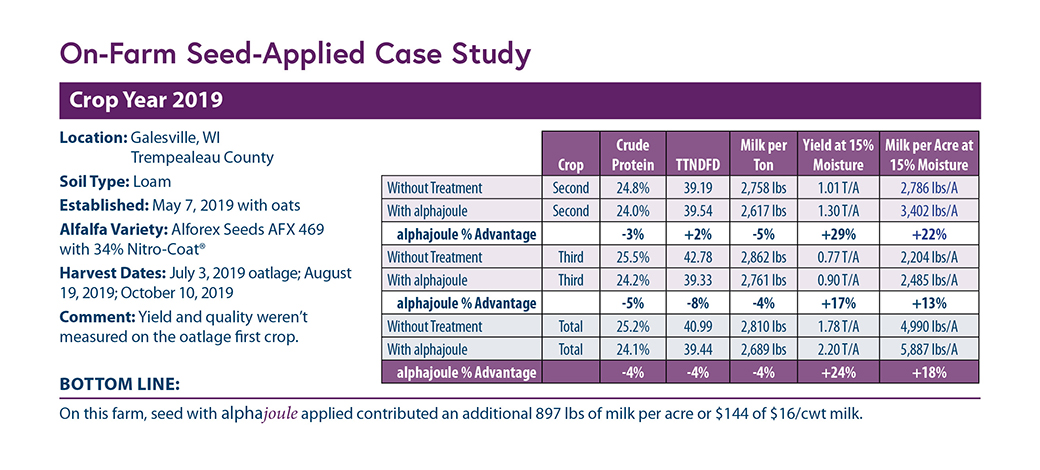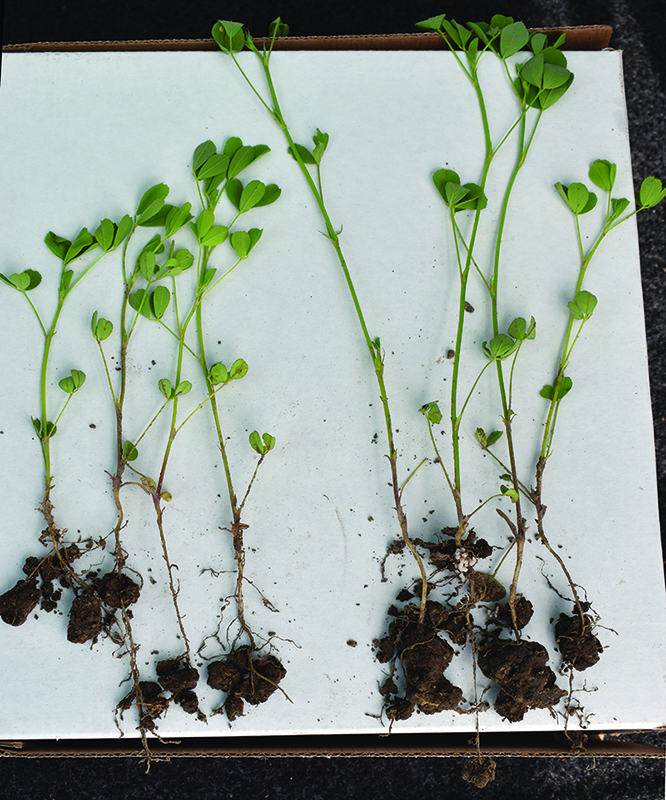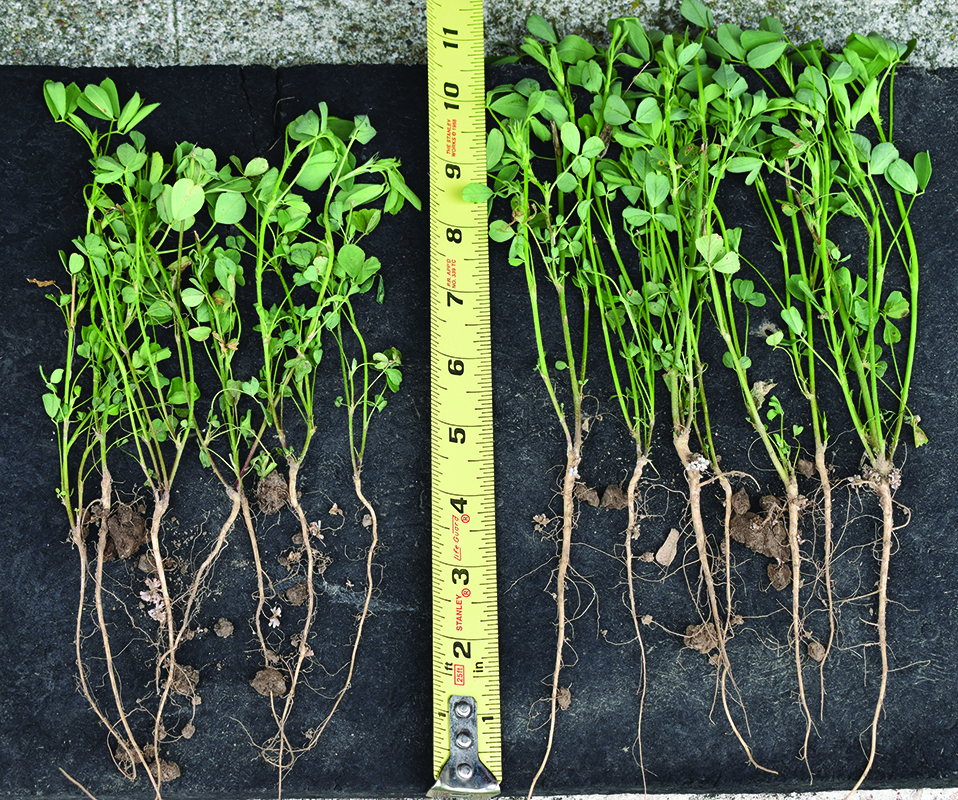alphajoule Biostimulant for Alfalfa
alphajoule® Biostimulant for Alfalfa
Available from Alforex Seeds

More Alfalfa Yield Potential in the Bag, Ready to Plant
Plant alfalfa seed with alphajoule™ biostimulant to reduce the effects of above and below ground stressors that:
-
- Slow germination and emergence
- Hold back seedling development
- Reduce seedling year yield potential and profitability.
What is alphajoule?
alphajoule from Agrovive, Inc is an in-plant biostimulant for alfalfa. It is comprised of proprietary strains of Pseudomonas flouresense and Bacillus megatarium bacteria. These bacteria strains are non-GMO and have a patent pending. These particular bacteria were selected from the natural environment and screened for their ability to accelerate germination, recycle nutrients, impact water use efficiency, and reduce the effects of abiotic and biotic stressors on alfalfa growth at the cellular level. The beneficial effects of alphajoule are available whether seed or foliar applied.
alphajoule In-plant Activity
When planted seed-applied alphajoule activity begins at germination. Firstly, as the germinating seed absorbs water, the alphajoule bacteria begin to multiply. The bacteria are carried along the radical and root hairs into the soil to aid phosphorus absorption. Indeed phosphorus is a vital nutrient for plant growth, especially during germination and seedling development. Because of this, alphajoule is able to enhance root growth, nodule formulation, hypocotyl extension, cotyledon emergence and aggressive above ground forage production. Secondly the alphajoule endophyte bacteria is able to move up the plant in the xylem and live in the inner cellular spaces and the cell walls of the crown, stem and leaves; as well as the roots where metabolism and cell division are regulated. Here the bacteria and the host cells have a symbiotic relationship that reduce the affect of plant stressors, and promote plant health, photosynthesis, carbohydrate production and field performance.
Season Long Benefits
Seed-applied alphajoule is effective in the plant from germination through multiple harvests during the establishment year. However, the first killing frost or soil temperature dropping below 32 degrees Fahrenheit will kill the bacteria. Therefore, dormant and semi-dormant production zones the must be reintroduced alphajoule bacteria for the following hay year.
When Happens When the Plant is Stressed?
When stresses begin to adversely affect cell functions in any part of the alfalfa plant, the production of ethylene is triggered within those cells. Ethylene is an anti-growth hormone that slows vital cell functions such as photosynthesis and promotes early maturity and leaf drop. Fortunately alphajoule’s multiple strains of bacteria mediate ethylene production within the stressed plant at the sub-clinical stage to reduce potential effects on yield, maturity, quality and persistence.
Common Lethal and Sub-Lethal Stressors of Germinating, Emerging, and Seedling Alfalfa
| Midwest, Eastern States, Spring Plant | Eastern, Plains, Mountain West States, Summer Plant | Southwest U.S., Fall Plant | |
| Abiotic Stressors | • Cold, wet soil | • Heat | • Drought |
| • Frost | • Drought | • Wind | |
| • Lack of heat units | • Salinity | ||
| • Frost | • Lack of heat units | ||
| Biotic Stressors | • Seed placement | • Late planting date and frost | • Late planting date |
| • pH and fertility levels | • Seed placement | • Seed placement | |
| • Disease: aphanomyces and phytophora root rot; Pythium, Rhizoctonia, Sclerotinia, etc. | • pH and fertility levels | • Poorly timed irrigation | |
| • Companion crop and /or weed competition | • Disease; Sclerotinia, etc. | • Disease; damping off complex | |
| • Herbicide effects | • Potato leaf hopper | • Weed competition | |
| • Weed competition | • pH and fertility levels | ||
| • Herbicide effects | • Herbicide effects |
Living, growing plant cells produce waste. alphajoule bacteria living in the cells and inner cellular spaces of alfalfa efficiently utilizes this waste as a food source. Consequently through metabolism, the plant and alphajoule recycle tied-up micronutrients and essential growth compounds back to plant cells to renew and maintain plant functions.
Case Study for alphajoule Biostimulant for Alfalfa


The plants on the right were established with seed treated with alphajoule. The plants on the left were left untreated. This photo was taken on June 18, 2019, and shows 42 days of plant growth while the plants competed under a nurse crop.

This photo was taken on July 17, 2019, 14 days after the oatlage nurse crop was harvested. Note the effect of alphajoule Biostimulant on the root development and top growth of the treated plants on the right. The difference resulted in a 29% yield increase for the second crop.
Additional Resources
- For more information visit agrovive.com
- Why Plant Coated Alfalfa Seed?


Comments
alphajoule Biostimulant for Alfalfa — No Comments
HTML tags allowed in your comment: <a href="" title=""> <abbr title=""> <acronym title=""> <b> <blockquote cite=""> <cite> <code> <del datetime=""> <em> <i> <q cite=""> <s> <strike> <strong>